Table 3.
Anticancer compounds obtained from plants.
| Plant | Compound | Structure | Results (IC50 µM) | Refs. |
|---|---|---|---|---|
| Aloe vera | Emodin |

|
In vitro: Breast (8.6); Lung (19.6); Liver (12.8) Induction of apoptosis, specific energy-dependent pathway of drug incorporation. |
[157,158] |
| Artemisia annua | Artemisinin |

|
In vitro: Lung (0.9) Production of reactive oxygen species, inhibition of cell cycle in G0/G1 phase, induction of apoptosis, inhibition of angiogenesis. |
[159] |
| Artesunate |
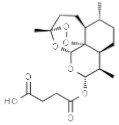
|
In vitro: Breast (2.3); colon (1.9); lung (9.8); leukemia (2); ovarian (15.0) Antiangiogenic effect; inhibition of VEGF expression. |
[160,161,162] | |
| Betula sp. | Betulinic acid |
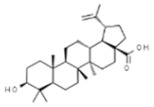
|
In vitro: Human leukemia (2.6); murine leukemia (2.1); cervix (2.5); colon (10.0); lung (4.3); skin (8.0); gastric (13.0) In vivo: (mice): Breast (13.5) Activation of extrinsic apoptosis pathway via up regulation of DR4, DR5 and PARP cleavage. |
[163,164,165,166] |
| Betulin |
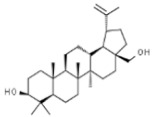
|
In vitro: Breast (30.7); colon (45.2); lung (45.2); leukemia (14.5); skin (6.8); prostate (17.9) Synergistic effect with chemotherapeutic drugs. |
[167] | |
| Berberis vulgaris | Berberine |
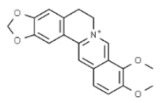
|
In vitro: Breast (25)/In vivo: Breast (25.0); colon (25.0) Induction of cell cycle arrest, synergistic effect with drugs/Reduction of tumor volume and angiogensis in a dose-dependent manner. |
[168,169] |
| Camellia sinensis | Epicatechin gallate |
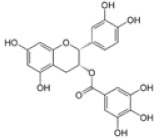
|
In vitro: Breast (350.0); colon (1000); lung (78.0) Induce apoptosis of cancer cell lines. |
[170] |
| Epicatechin |

|
In vitro: Colon (60); prostate (8.9); ovarian (7.9) Growth inhibition. |
[171] | |
| Epigallocatechin |
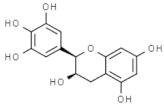
|
In vitro: Breast (22.0); colon (75.0); lung (70.0) Growth inhibition. |
[172] | |
| Combretum caffrum | Combretastatin |
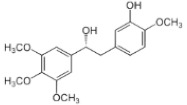
|
In vivo (mice): Breast (80-190); colon (8.4;) lung (7.1); leukemia (1.9) β-tubulin binding, causing the destabilization of the microtubules. |
[161,173] |
| Crocus sativus | Crocetin |

|
In vitro: Colon (0.2); lung (0.4); liver (0.6) Activation of Nrf2, reduction of lactate dehydrogenase A expression. |
[174] |
| Crocin |
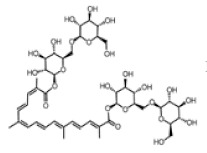
|
Inhibition of cancer cells’ proliferation or/and induction of apoptosis, both in vitro and in vivo studies. | [174,175,176] | |
| Safranal |

|
In vitro: Colon (20.0) Apoptosis and G2/M cell cycle arrest mediated by suppression of mTOR/PI3K/Akt pathway. |
[177] | |
| Euphorbia peplus | Ingenol mebutate |
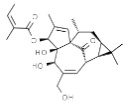
|
In vitro: Breast (23.9); colon (22.2); lung (15.2); skin (200.0); prostate (29.8) Necrotic mechanism. |
[178,179] |
| Gardenia jasminoides | Geniposide |

|
In vitro: Lung (351.5); medullobalstome (293.5) Activation of mitochondrial execution pathway by Caspase-9 and -3; increase levels of Bax in response to p38MAPK signaling initiation of the mitochondrial death cascade. |
[161,180] |
| Genipin |

|
Inhibitor of mitochondrial uncoupling protein 2, induction caspase-dependent apoptosis in vitro and in in vivo models. | [181] | |
| Ginkgo biloba | Ginkgetin |
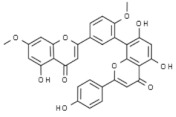
|
In vivo (mouse): Breast 10.0; colon 5.0; lung 10.0; prostate 5.0 p62/SQSTM1-mediated autolysosome formation and redox setting; inhibition of signal transducer and activator of transcription 3 activity. |
[182,183,184] |
| Bilobetin |
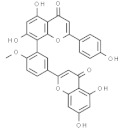
|
In vitro: Breast 57.6; lung 36.4; leukemia 46.0 Arresting the G2/M phase of the cell cycle. |
[185] | |
| Isoginkgetin |
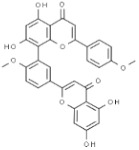
|
In vitro: Breast 91.2; lung 43.0; skin 18.8 Arresting the G2/M phase of the cell cycle. |
[185] | |
| Glycyrrhiza glabra | Licochalcone |

|
In vitro: Lung (30.0); skin (50.0); liver (44.13); gastric (42) Increased mRNA expression of DR3, DR5, caspases-3, caspases-8, caspases-10, Fas, Bad, Bax, Bcl-2, Bak, and PUMA; decreased level of PKCε, p70S6K, Akt. |
[186,187] |
| Licoagrochalcone |
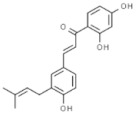
|
In vitro: Breast (28.6;) colon (25.4); leukemia (12.2); kidney (35.21) Induction of apoptosis, inhibition of proliferation. |
[188] | |
| Matricaria chamomilla | Apigenin |

|
In vitro: Breast (100;) lung (93.7); liver (38.9) Up-regulation of DR5 pathway. |
[189] |
| Chamomillol |

|
In vitro: Breast (300.0); colon (165.0); prostate (200.0); liver (300.0) Regulation angiogenesis by down regulating expression proteins. |
[190,191] | |
| Panax ginseng | Panaxadiol |
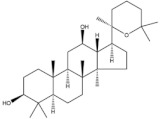
|
In vitro: Colon (25.0); liver (1.2) Regulation of cell cycle transition and the induction of apoptotic cells. |
[192] |
| Ginsenoside |
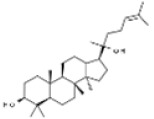
|
In vitro: Breast (30.0); colon (100.0); lung (50.0); skin (25–100) Induction of apoptosis, inhibition of proliferation. |
[193] | |
| Papaver somniferum | Noscapine |
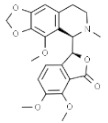
|
In vivo (mice): Breast (45.0); lung (73.0); leukemia (20.0); pancreas (70.0) Activating multiple signaling pathways including apoptosis. |
[194] |
| Persea americana | Borbonol |
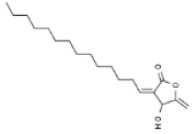
|
In vitro: Breast (20.5) Inhibition of proliferation. |
[195] |
| Salvia prionitis | Salvicine |
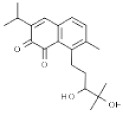
|
In vitro: Breast (1.4); leukemia (3.6); stomach (1.8) Breaks two strands of DNA by facilitating TOP2 activity; inhibits re-ligation |
[196,197,198] |
| Cryptotanshinone |

|
In vivo (mice): Breast (1.1;) lung (20.0); leukemia (4.8) Multispecific modes of actions: G2/M arrest, apoptosis, inhibition of cellular movement. Inhibition of NFκB orchestrates all these mechanisms. |
[199,200,201] | |
| Salvianolic acid |

|
In vitro studies. Prompting apoptosis, disturbance of cell cycle and adjourning metastasis. |
[202] | |
| Silybum marianum | Silibinin |

|
In vitro: Breast (24.0); skin (100.0); prostate (55.6); ovarian (25.0) Induction of apoptosis and cell cycle arrest. |
[203,204,205] |
| Silymarin |
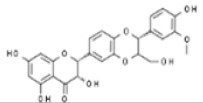
|
In vitro: Breast (75); prostate (67.9) Interference with expressions of cell cycle regulators and proteins involved in apoptosis; induction of cell cycle arrest. |
[203,206,207] | |
| Zingiber officinale | Paradol |

|
In vitro: Breast (20.4;) colon (10.4); leukemia (100); liver (>100). Reduction of cell viability. |
[208,209] |
| Shogaol |

|
In vitro: Breast (24.4); colon (3.1); lung (25.8); liver (18.7) Inhibitory activity. |
[209,210] |
